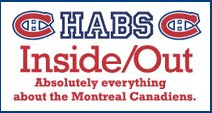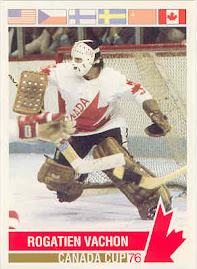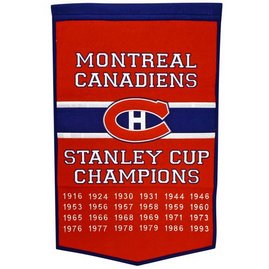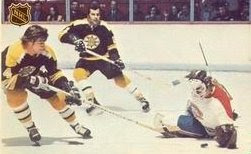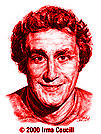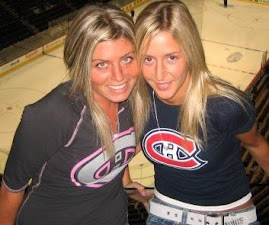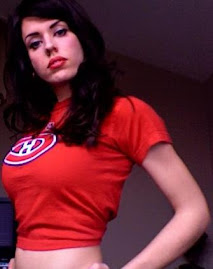
(Robert L Note: Of all the goalie pieces I researched last summer, the following post on Charlie Hodge is one of my favorites. Back in May of this year, Gary Kinston of the Vancouver Sun caught up with Hodge, then 73, for an excellent glimpse into the personality of a great forgotten Habs goalie. One year prior to the Sun piece, there was an equally informative Q & A with Hodge at the Coolopoulis site, that I have include here as well. His memories of teammates such as Jacques Plante and Doug Harvey are precious. As a teammate in tandem with both Plante and Gump Worsley, Hodge was rarely if ever in the spotlight - which is unfortunate, because as Kingston reveals - the man is quite the character. Kingston's interview with Hodge appears below his career encompasing bio. I hope you enjoy it.)
Charlie Hodge, a Lachine, Quebec native, caught the attention of the Montreal Canadiens scouts as a teenager and once committed to the team, he began his apprenticeship with the Junior Canadiens in 1949-50.
In 1951-52, as the undisputed starter on the junior Habs,he turned in a league low goals-against average of 2.22. The following season, Hodge won 35 of his 44 starts and led the QJHL with five shutouts. Moving on to the professional ranks in 1953-54 with the Cincinnati Mohawks of the IHL, Hodge proved spectacular, with a league high 10 shutouts and a 2.34 GAA. His goaltending was an integral part of the team's regular-season and Turner Cup championship performance.

While waiting patiently for a chance to play in the NHL on a full time basis, Hodge's minor pro tour took him through the QSHL, WHL, AHL and the EPHL. He proved to be a workhorse and a success wherever he strapped on his pads.
Four times he was placed on either the First or Second All-Star Teams of the league in which he played. Hodge thought he caught his first major break with a 19 win and four-shutout performance in 30 appearances for the Canadiens in 1960-61, but a starters role was not yet in the cards.

Early in 1963-64, starting his third consecutive season with the AHL's Quebec Aces, the tide finally turned in his favor. Hodge was called in to replace the injured Gump Worsley as the Canadiens starter. He stepped in admirably by registering 33 wins and an NHL best 8 shutouts. His stellar work was recognized at the conclusion of the season when he was named the winner of the Vezina Trophy and selected to the NHL Second All-Star Team.
Despite being a part-time veteran of the NHL, many wondered if Hodge's success in 1963-64 was a fluke. These reservations proved inaccurate as the plucky netminder put up a 26-16-10 mark in 1964-65. His fine work contributed to the Habs' first Stanley Cup win since 1959-60.

Hodge and Worsley worked superbly together in 1965-66. The shining duo led Montreal to a repeat Stanley Cup performance and shared the Vezina Trophy after recording the stingiest goals against average in the league.
The next year, things began to unravel for Hodge. While he appeared in 37 regular season games, he was the odd man out after young phenomenon Rogie Vachon was called up late in the schedule and played superbly.

Hodge was left unprotected by Montreal and was claimed by the Oakland Seals in the 1967 Expansion Draft. In a matter of months, the veteran backstopper went from an elite defensive club to an inexperienced outfit that guaranteed his exposure to an enormous number of shots. Hodge fought on bravely in 1967-68 with three shutouts and 13 wins in 58 games while sharing the goaltending chores with youngster Gary Smith.

His playing time diminished in 1968-69 and he was demoted to the Vancouver Canucks of the WHL. Hodge played a handful of games the following season before being claimed by the NHL Canucks in the 1970 Expansion Draft.

It seemed that the black cloud of disappointment surrounding his demotion to the WHL two years earlier had a silver lining. Hodge, Dunc Wilson and George Gardner provided the NHL's newest club with solid goaltending, a factor contributing to a respectable 56-point showing for the team.

Hodge retired after his only season in Vancouver. His NHL resume listed a number of individual and team accomplishments along with 24 career shutouts and 152 regular season victories.
Crusty Old Bird Dog Hodge Still Beating The Bushes
Former NHL goaltender Charlie Hodge with his miniature version of the Vezina Trophy, which he won in 1963-64 with Montreal. Photograph by : Ian Lindsay, Vancouver Sun
If he didn't gain fame as an NHL goalie, Charlie Hodge has earned legendary status as a Western Canadian scout.
By Gary Kingston, Vancouver Sun, Saturday, May 26, 2007
With his everpresent overcoat draped over one arm and his scouting binder tucked under the other, navy-blazered Charlie Hodge strides briskly down the Pacific Coliseum concourse, headed for the exit doors.
The Vezina Trophy winning goalie is 73 now."23, don't be giving me that bullshit!" he will rant later, white haired and garden gnomish. But he's motoring.
And there's no time to stop. Certainly not for a reporter whom he ducked after the first period of Tuesday's Memorial Cup game after grudgingly agreeing to an interview.
Asked for a phone number, he mumbles it while plowing ahead, forcing the hard of hearing reporter to follow him through the door to get it repeated a couple of times.
Four minutes remain in a game the Lewiston Maineiacs are leading 1-0 after scoring two minutes earlier, but Hodge is making a beeline for the parking lot. He needs to beat the crowd.
When you're driving home to Aldergrove, every minute not spent in a crush of people or stuck in traffic counts.
Never mind that the Plymouth Whalers tied the game with a minute remaining and then won it in the first overtime period. By that time, Hodge was probably on the Port Mann Bridge.
His buddies in the business will grin knowingly at the story. Typical Charlie.

Get to the game way too early, then leave before it's over if possible, grumbling all the way.
"If he's not cantankerous when he gets to the rink, he's not feeling good," veteran Edmonton Oilers scout Bob Brown says.
It is said with a healthy measure of endearment. Hodge, now a scout for Tampa Bay after nearly two decades with the Pittsburgh Penguins, is a classic, old school character. A loveable, good hearted grouch. A guy who engenders considerable respect, but who also serves as a convenient foil for wise cracking colleagues who fire shots at him as regularly as National Hockey League forwards did 40 years ago.
"If you don't irritate him, don't bug him, he'd think you're upset with him and that's the truth," grizzled New Jersey scout Glen Dirk says.
The hard slogging of an NHL amateur scout's season is mostly done by the time the Memorial Cup begins. The cold winter nights spent bouncing from arena to arena are over, the comprehensive player reports long since filed, the departmental meetings finished, at least until everybody gathers at the entry draft in June.
"I don't travel anymore," says Hodge, who watches the Vancouver Giants and Chilliwack Bruins of the WHL and the Lower Mainland clubs in the B.C. Hockey League. "So when I watch the Memorial Cup, I'm interested in what players (in the OHL and QMJHL) have been recommended by our staff, three guys on Lewiston and, on Plymouth, an overager that we're looking at. One of them stuck out, but his intensity is lacking. He's got skill, but he lacks that intensity."
With most NHL teams carrying 10 to 15 man scouting staffs and decisions made collectively, it's difficult for outsiders to accurately assess a scout's acumen. "It's a groups pick," says Hodge. "You wouldn't want it any other way."
Asked to identify one guy he can proudly say he urged an organization to take, he mentions Andrew Ference, a defenceman out of Portland taken by Pittsburgh in the eighth round in 1997.
"He went to Pittsburgh, but the coaches really didn't want him. He was on the small side. But he went to Calgary and played in their top four until they traded him last season to Boston. He was one kid I pushed for a lot."
Hodge, a native of Lachine, Que., was an undersized battler of a goalie at 5' 6" and 150 pounds.
He won a Memorial Cup in 1950 as a backup with the Montreal Jr. Canadiens and got his name on five Stanley Cups as a member of the Montreal Canadiens (though he only actually played in one final, in 1965). He won the Vezina Trophy outright in 1963-64 and shared it with Gump Worsley in 1965-66.
Interestingly, Hodge's early pro hockey career might have cost him a chance to compete at the 1956 Olympics in Melbourne as a canoeist.
He's still ticked about it.

With my partner Arthur Jordan, we won the North American paddle tandem in 1955, beat a team that ended up representing Canada in 1956 and a team that represented the U.S. But then I was basically kicked out because I was being paid to play hockey.
"The way things are now, they got all kinds of pros in the Olympics. I did not see any relation to canoe racing and hockey, no relationship at all, so I'm a little disappointed."
It's a story that's not well known among his colleagues and word of it ignites Dirk, who has more one liners than a collection of bad NHL teams.
"He can't even swim, for Christ's sake. He's probably the only canoeist who wore those blow up water wings."
Hodge went to the Oakland Seals in the 1967 expansion draft and won a Western Hockey League title with their farm team, the WHL Vancouver Canucks in 1969. After another year in Oakland, the expansion NHL Canucks claimed him and he went 15-13-5 with a 3.42 goals against average in 1970-71, sharing netminding duties with George Gardner and Dunc Wilson.
When he and Canucks general manager Bud Poile couldn't agree on contract terms the next year, Hodge retired. He coached the junior Vancouver Nats for parts of two seasons and sold real estate in the Lower Mainland for the next decade until former teammate John Ferguson, then the Winnipeg Jets GM, talked him into working as a scout.
He scouted all over North America before eventually concentrating on the West. Over time, his fastidious habits, his "at the rink" seriousness and his fussy eating habits, "Boston Pizza, Swiss Chalet, that's it," says Dirk, became the fodder for great pranks and lively stories, some of which you can even tell in a family newspaper.
"We were at Bowling Green University," recalls a Toronto Maple Leafs scout. "Charlie used to have this brown leather coat with fur around the collar and they got this owl mascot. During the warmup, Charlie's watching real serious, writing the lines down. We get the mascot to go sit beside him. You can see the mascot pointing to his feather collar and then pointing to Charlie's coat. Charlie doesn't catch on at first, but all the fans are just howling. Finally, Charlie looks over and goes "Will you fuck off" and the whole rink explodes."
The same scout says that while he was coaching, Hodge came down before a game one night to get line combinations. He gave him phoney combinations and unused jersey numbers.
"Ruined his whole game."
It drives Hodge nuts, another scout says, when junior teams dress a player for warmup without a name on his jersey.
"He's just got to find out who it is, when he was born, whatever", the Leafs scout says. "We say 'Charlie, if he's not good enough to have his name on his sweater, he's not good enough to draft."
Hodge defends his attention to detail, including his insistence on being at the rink at least two hours before the puck drops, with a bit of self deprecating humour. "I don't feel I'm overly intelligent, so what I do is try to get everything organized before the game so I don't fool myself."
Young St. Louis scout Barclay Parneta says Hodge is nobody's fool.
"He has the act where he kind of pretends like he has no idea what's going on, but I've spent enough time to know he knows exactly what's going on," says Parneta.
"When I came in, sort of the new guy, Charlie was more than willing to drive with me or take me places and treated me the same as guys he played with in the NHL who had been scouting for 30 years. He really helped me out a lot."
But even Parneta has got a classic Charlie story.
"Canuck scout Ron Delorme, Dirk, Charlie and I drove to Kelowna once. We're eating at Swiss Chalet, but we're running a little behind. You get dessert with your meal, but Charlie's standing up going 'C'mon, c'mon we got to get going' even though it's still an hour and half before we've got to be at the game. Dirkie says to the waitress 'I want the pecan pie, but I'm not going to have enough time to chew the nuts because we've got to go.' Charlie's flustered if he doesn't have his routine."
Hodge, who refers to all his nemeses with "oh, he's a real bug," says he loves the kibitzing, even from the acerbic Dirk, an occasional travelling companion of whom he laughingly says: "He's brutal, cruel, he's got the great lines."
Hodge had triple bypass surgery 14 years ago and jokes that every day he wakes up in the morning is a bonus. So why, at age 73, isn't he sitting on a lakeside dock somewhere, taking life easy and not worrying about line combinations, birthdates and a teenager's intensity level?
"Actually, if you must know, I'm goddamn afraid I'll wake up one morning and not have anything to do. I just feel I have to have something to do," Hodge says.
Those who know him well say his life revolves around hockey and immediate family. He shares a house with one of his three sons and a developmentally challenged grandson, whom he looks after on many afternoons. His wife, Sheila, lives nearby in a townhouse.
"We're still married, we just don't live together," Hodge says.
 Coolopolis Interview
Coolopolis Interview With Montreal Canadiens Goalie Legend Charlie Hodge
Here's a chat with pint sized Charlie Hodge, 72, who now lives in Langley, BC but grew up in Lachine and went on to star in the nets for the Montreal Canadiens between 1954 and 1967. We spoke this afternoon, January 2, 2007.
Q: It seems a lot of goaltenders die young, thankfully you're still going strong.
A: I have a theory about that, relating to my own case. When we used to travel it would be by train and we had our own car and a lot of the boys used to smoke cigars. When I had my first and second heart attacks they kept telling me that I was a smoker. I never smoked in my life, so I can only assume that second hand smoke is deadly like they say. I was in Calgary working as a scout, I was about 54, when I had my first one, then I ended up the next year in Jackson, Michigan and had another heart attack. They kept accusing me of being a smoker. They said you might walk out and drop dead or we could send you to Ann Arbour and have surgery. I asked, what’s my chances with bypass surgery? It was like fifty-fifty. I was 56 at the time. I had the bypass and it’s been fine since.
Q: Do you think stress is the big goalie killer, goalies throwing up before games and stuff?
A: I’d have an upset stomach, my stomach used to knot up but Glenn Hall was the only one I heard of that threw up. Mine would tighten up, but that’s it.
Q: What do you do now?
A: I still scout hockey. I am an antique. I scout for Tampa Bay. I went through three teams, Winnipeg, I got fired from there when John Ferguson lost his job. Then I got hired in Pittsburgh and two years ago they let me go, there was a bit of skulduggery involved in that one, but we won’t get into that. They let three of us go at the same time. The other two guys got hired this year, so everybody from Pittsburgh got rehired. But I don’t do any traveling, I just do local around here.
Q: Do you still see your old hockey buddies?
A: Sure, we see each other and we kibbutz. But I don’t get to go back to Montreal, I should go back. I’ve been invited back, but I don’t go back, it’s just too much of a problem to go. I’ve done so much traveling in my life.
Q: Where did you grow up in Montreal?
A: On Georges V in Lachine. Originally it was 70 A George V and then they changed the numbers so it became 322 Georges V (the homes have all been demolished and it's industrial there now). I was born in that house and lived for 21 years in it.
Q: What sort of family background did you have?
A: My dad was a welder he worked for the Dominion Bridge Company. I have no brothers or sisters.

Q: They wouldn’t let you play on the high school team, so you quit school?
A: When I was going to school, I ended up playing for Junior Canadiens with Sammy Pollock and the assistant principal who was my French teacher at the time said to me, "if you don’t play for the school, we’re going to take you to court." When you’re 16 years old, you get a bit concerned. My parents didn’t have any money. We didn’t know about these things. So I quit school. I went out with the Junior Royals in 1949 and at that time Tag Miller was the coach. I went out to practice with them and during the summer, Tag Miller who was only 37, died. So a new coach took over and all he had was my name, so he invited me to camp. When I got to camp I ran into somebody and he said, "you’re too small, go home." So I went home and the coach phones me up the next day and he says "where were you?" I explained someone told me to go home because I was too small." He said "come on in." The same guy catches me the next day and said "go home." So I go get undressed, I go home, coach phones me up. He said "you come and see me, you are going on the ice." I went on the ice, I practiced half a practice, that was it. I went home. So the fellow who recruited me said "alright we’re going to talk to Sammy Pollock." He said "come on out." So I went out and played.
Q: Did you know at that point that you’d be a pro hockey player?
A: You have ambitions but it was a far cry from being a professional. Every kid has ambitions.
Q: What’s your most memorable game?
A: The one I relish most, if I picked one, would be the last game of the season when first place was on the line and the Vezina Trophy was on the line, it was myself and Glenn Hall. I think we were a goal apart, that was all, so we were playing in New York and that was after they had traded Plante to New York, so that was quite the game.
Q: Plante was seen as the one who blocked your career by holding the number one job, did you have mixed emotions towards him?
A: I always got along good with Plante. He helped me, in all honesty he helped me in some of the things that he pointed out to me. Plante was more of a student of the game, in other words he used to calculate everything out and he helped in that way. We weren’t friends off the ice, he was in a world of his own, but on the ice I feel that Plante helped me let’s put it that way. I didn’t mind him. But he got most of the ice time. One thing that you probably don’t know, when Dick Irvin was coaching, I think it was Dick, we were playing in the playoffs, playing against Boston and Plante and I would change every third shift. You have to go back a few years for that, but it was in the 50s and Plante and I would change every third shift, and against Boston it worked out pretty good. But when we played Detroit they rapped seven goals past us that night and that was the end of me. I sat on the bench. They rapped three past me and four past Plante. But he was the starter so I was the one that sat.
Q: Which character stands out most in your memory?
A: I guess you’d have to say Doug Harvey. He was a pretty good guy. He was good to everybody but himself and his family. Or Dickie Moore. He was another wing ding that I liked. They were a little crazy and I think most of the friends I hang out with now are still pretty crazy.
Q: I guess you guys were like kings of the city when you’d walk around town.
A: People wouldn’t recognize me much but they’d recognize Dickie, Doug or the Rocket.
Q: Doug Harvey, do you figure he was one of the best?
A: He was one of the better players but you couldn’t pick out one guy, it would be unfair to the rest of them, there had been a lot of pretty good players in those years.
Q: Do you consider yourself one of the top goalies?
A: I don’t think that, but for someone in my position I figure I achieved possibly more than I had hoped for.
Q: I hear you had to work summers as a player.
A: I worked with Goodyear Tire and Rubber in the early days. After that I got a little established I used to do two months of hockey schools, Montreal and Worcester Massachusetts and other different places.
Q: Was it hard work at the tire company? Not really. Sam Pollock got me in through a friend when he first got the job, like I said I just quit school and didn’t have anything going and Sammy got me going with Goodyear.
Q: I guess your mother and your father have passed away by now?
A: No. Well, my father John Hodge died in September 1954 and I played my first game in October 1954. He had lost an eye with the welding and what he’d do was move all the furniture out. We didn’t have a living room dining room but we had a combined room, so he built a four by six net with potato sacks behind it for mesh and get on his hands and knees and shoot tennis balls at me.
Q: So you played a lot or did you go to games as a kid too?
A: We didn’t have the $2 to go to a game. You’d go once a year, or something. Things were a little different in those days.
Q: Do you still know people in Montreal?
A: My paddling buddy Arthur Johnson (aka Perky Johnson) is there. We got screwed in the Olympics. (Johnson lost Hodge as a partner when Hodge was disqualified for being a professional athlete). Well, he got screwed. I did too but I had something else, but he didn’t have something else. This was his whole life so they ended up switching him over and putting him in with one of the Goerge Bosse’s cousin so that’s where that went. They kicked me out because I was a pro hockey player. I don’t know what that had to do with canoeing. The US team that won the '56 Olympics, well we beat them in 1955.
Q: Do you cheer for any hockey team?
A: Well, the one I work for. Tampa Bay. You’ve got to be loyal to your employer.
Q: Is there anything you miss about Montreal, a restaurant or something?
A: Well, the restaurant that I like is also here (Langley BC), it’s Swiss Chalet, it started in Montreal.





















































